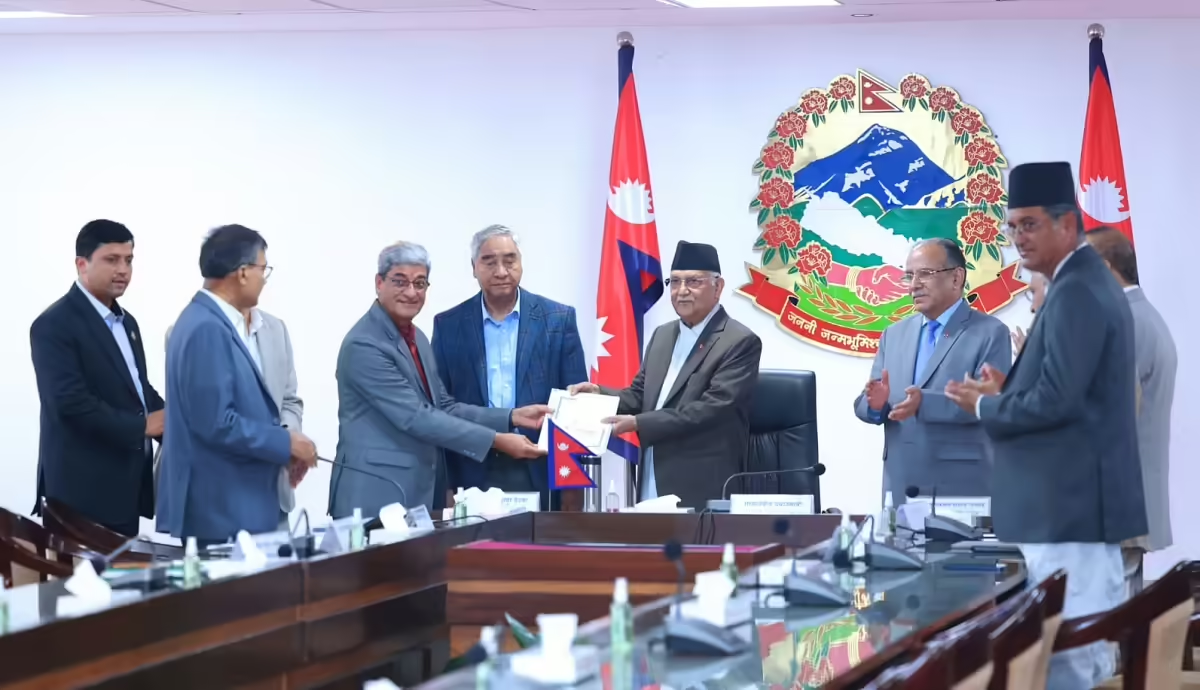KATHMANDU: The Maoist Center, which waged a decade-long armed rebellion before joining mainstream politics, marked the 30th ‘People’s War Day’ on Wednesday.
The anniversary comes at a time when Nepal’s long-stalled peace process remains incomplete, despite the passage of key legislation aimed at addressing war-era human rights violations.
The Maoist conflict, which lasted from 1996 to 2006, claimed the lives of over 17,000 people and displaced thousands more. The insurgency, launched by the Maoist party against the monarchy and parliamentary system, aimed to establish a communist republic.
After years of violence and political upheaval, the armed struggle ended in 2006 with the signing of the Comprehensive Peace Agreement (CPA) between then-Prime Minister Girija Prasad Koirala and Maoist Chairman Pushpa Kamal Dahal.
The agreement paved the way for Nepal’s transition to a federal democratic republic, abolishing the 240-year-old monarchy and integrating former Maoist combatants into the national army. However, 18 years after the peace accord, the country has yet to fully implement the transitional justice process designed to address war-era crimes.
The Truth and Reconciliation Commission (TRC) and the Commission on the Investigation of Disappeared Persons (CIPD), two key bodies tasked with investigating human rights violations and enforced disappearances, have yet to be reconstituted due to political deadlock.
Despite the passage of the Truth and Reconciliation Commission (Third Amendment) Bill last year, the commissions remain non-functional as leaders from major political parties continue to disagree over appointments.
Politics and the TRC Bill
The TRC Bill, which was stuck in parliamentary limbo for years due to disputes between the ruling Nepali Congress (NC), UML, and the opposition Maoists, was finally passed by both houses of parliament last year.
It was authenticated by President Ram Chandra Paudel on August 29, 2024. The ruling parties hailed the passage of the bill as a historic achievement, claiming it would bring Nepal’s long-delayed peace process to a conclusion.
The government had formed a recommendation committee, led by former Supreme Court Chief Justice Om Prakash Mishra, to select the chairperson and members of both commissions. The committee, formed on October 18, 2024, had a 60-day mandate, expiring on December 16.
It received 158 applications for the positions and shortlisted 40 candidates. Of these, eight individuals were shortlisted for the two chairperson positions, while 32 were considered for the eight-member posts across both commissions.
However, internal political wrangling derailed the appointment process. The committee failed to reach a consensus on key appointments and was dissolved before it could complete its task. Attempts to finalize recommendations on December 15 and 16 collapsed due to disagreements among political factions.
Committee spokesperson Khamma Bahadur Khati stated that the lack of consensus prevented the committee from making recommendations, warning that forcing a decision without broad political agreement could have long-term consequences.
In a statement issued on December 16, he justified the dissolution of the committee, arguing that a more extensive and inclusive process was needed to ensure credible appointments.
The committee’s abrupt dissolution sparked criticism from various quarters, particularly from the UML, which accused the government of deliberately obstructing the process. UML Chief Whip Mahesh Bartoula, speaking to Khabarhub, argued that the committee had a clear legal mandate and should have been allowed to complete its work. He claimed that the government had created an “environment of non-cooperation” that led to the committee’s failure.
Maoist frustration
Maoist Chair Dahal, who has played a central role in Nepal’s peace process since the end of the armed conflict, expressed frustration over the delays. He accused the government of using the TRC Bill as a political bargaining tool rather than prioritizing justice for conflict victims.
“I do not see that the core leadership of the government is very interested in concluding the peace process,” Dahal said in an interview with Khabarhub. “This bill should have been passed two years ago, but everyone knows that the current Prime Minister [KP Sharma Oli] stalled it. Even now, he does not seem to be in a hurry to implement it. He views it more as a bargaining chip than a matter of justice.”
Dahal said he has been in discussions with Nepali Congress President Sher Bahadur Deuba and Home Minister Ramesh Lekhak, who played a key role in advancing the TRC Bill, to push forward the formation of the commissions. He also mentioned ongoing talks with Deuba regarding the selection process for commission officials.
“The last time I spoke to him, I suggested that a new recommendation committee should be formed only after three top leaders—myself, Oli, and Deuba—sit down and finalize the matter. Otherwise, we risk repeating the previous failure,” he said.
Political will vs transitional justice
The UML, which leads the current government, insists that it remains committed to finalizing the peace process. UML Chief Whip Bartoula emphasized that forming the commissions is a political issue as much as a legal one, and finding a consensus among major parties is essential.
“The commission is not just a legal body; it is linked to the entire conflict resolution process. The government has given high priority to forming the commissions, and we will move forward soon,” he told Khabarhub.
Bartoula also argued that previous commissions failed to function effectively, and the next set of appointees must have the ability to navigate the peace process politically.
“Nepali Congress and UML may need to discuss how to move forward while keeping the Maoists, as a key stakeholder, involved in the process. The commissions formed in the past have not delivered results. We need consensus among the three parties to find someone who can politically manage this process,” he said.
While political parties continue to debate, thousands of victims of Nepal’s civil war remain in limbo. The Commission for Investigation, Truth, and Reconciliation of Disappeared Persons Act 2014 stipulates that the commissions will have five members each, including a chairperson. At least one member must be a woman.
Candidates must hold at least a master’s degree from a recognized institution, be non-partisan, have experience in human rights, conflict resolution, or law, and be over 35 years old. The chairperson must have previously served as a Supreme Court judge, Chief Justice of an appellate court, or in a special category position in the Nepal Judicial Service.
According to former TRC Chairperson Ganesh Dutta Bhatta, around 64,000 complaints were registered with the commission from across the country. Preliminary investigations were completed for 3,700 cases, while 3,000 complaints were officially filed. Of these, 2,200 cases reached a decision. The commission has issued identity cards to 600 conflict victims and recommended 538 individuals for compensation.
Similarly, 3,288 complaints were lodged with the commission investigating enforced disappearances. While 754 cases have been resolved, 2,534 remain pending.
Despite these efforts, the majority of conflict-era cases remain unresolved, leaving victims without justice. For many, the continued delays have led to frustration and disillusionment with Nepal’s political leadership. The longer it takes to finalize the transitional justice process, the harder it becomes to ensure accountability for wartime atrocities.
As the Maoists commemorate 30 years since launching their armed rebellion, the unfinished business of the peace process casts a long shadow over Nepal’s democratic journey. The question remains: will Nepal’s leaders finally prioritize justice, or will political disputes continue to keep victims waiting?









Comment